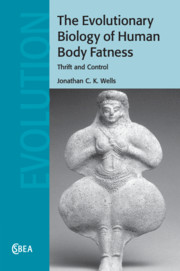Book contents
- Frontmatter
- Contents
- Preface
- 1 Introduction
- 2 Human fatness in broad context
- 3 Proximate causes of lipid deposition and oxidation
- 4 The ontogenetic development of adiposity
- 5 The life-course induction of adiposity
- 6 The fitness value of fat
- 7 The evolutionary biology of adipose tissue
- 8 Adiposity in hominin evolution
- 9 Adiposity in human evolution
- 10 The evolution of human obesity
- References
- Index
1 - Introduction
Published online by Cambridge University Press: 30 March 2010
- Frontmatter
- Contents
- Preface
- 1 Introduction
- 2 Human fatness in broad context
- 3 Proximate causes of lipid deposition and oxidation
- 4 The ontogenetic development of adiposity
- 5 The life-course induction of adiposity
- 6 The fitness value of fat
- 7 The evolutionary biology of adipose tissue
- 8 Adiposity in hominin evolution
- 9 Adiposity in human evolution
- 10 The evolution of human obesity
- References
- Index
Summary
The tendency to associate high body weight and adiposity primarily with ill-health is a relatively new perspective in the history of nutrition. A fundamental theme throughout the human historical record has been preoccupation with the threat of food insecurity, hunger, under-nutrition and disease-induced anorexia. References to frequent famine, plague and other instances of malnutrition are evident in the earliest world literature, and many aspects of the first urban communities represented efforts to consolidate agricultural productivity and food supplies through systems of crop irrigation, food storage and redistribution, and social organisation (Newman et al. 1990). Historical records from Mesopotamia from 3000 to 1400 BC, for example, describe the rations given to workers in return for their labour on projects such as irrigation systems, which can be used to estimate approximate dietary energy intake. These data suggest ‘that Mesopotamians knew what it took to feed an adult and for the most part attempted to provide it’ (Newman et al. 1990).
How well early civilisations addressed periods of food shortage was strongly correlated with their persistence over time. Free food distribution during times of scarcity was practised in the late Roman Republic, not for humanitarian reasons but in order to suppress popular unrest (Newman et al. 1990). Numerous authors have documented collapses of civilisations because of climatic stress or wars undermining agricultural production or the availability of wild foods, as reviewed previously (Fagan 1999).
- Type
- Chapter
- Information
- The Evolutionary Biology of Human Body FatnessThrift and Control, pp. 1 - 15Publisher: Cambridge University PressPrint publication year: 2009



